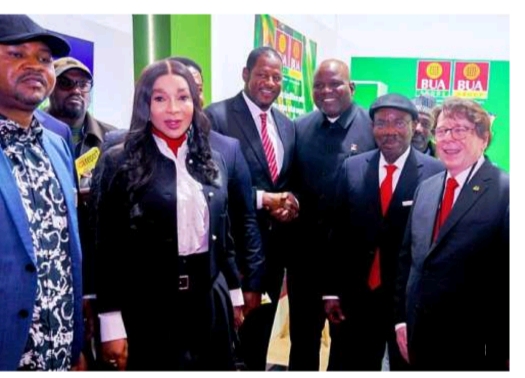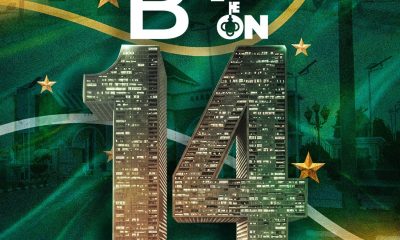Business
HOW TO IDENTIFY FAKE REAL ESTATE COMPANIES IN LAGOS BY DENNIS ISONG

HOW TO IDENTIFY FAKE REAL ESTATE COMPANIES IN LAGOS BY DENNIS ISONG
Last year, Mr. Ezekiel was looking for a small house to buy so that he can stay there anytime he comes to Lagos (his family is in Benin and he doesn’t want to keep renting an apartment because of his experiences with people).
There was a signpost of a real estate company he used to see anytime he was on his way to work. Then, he decided to make inquiries from them.
He was ushered in with so much excitement as if they had been waiting for him all along. He thought, well, maybe it’s part of customer care service.
Then, he described the kind of property he wanted and they said they don’t have it yet but tried to convince him to buy land. He yielded after so much persuasion.
He was told that it would take a few weeks before he can be allocated and Mr. Ezekiel was fine with it.
On the week of allocation, excuses kept falling on excuses from the real estate company. Initially, Mr. Ezekiel didn’t have any reason to doubt but at some point, he felt uncomfortable and decided to go with a friend.
The real estate company sent someone to take them to the place. On getting there, Mr. Ezekiel was shown the land and this representative found a way to excuse himself that he would be back unknown to Mr. Ezekiel and his friend that the guy had absconded, leaving them there.
Some minutes later, a man approached them and asked them what they wanted. Mr. Ezekiel said he had come to inspect his land. The man gave a roaring laughter and he said, “it’s your turn today. Anyway, this land belongs to Alhaji Umaru and if you walk another 2 miles, you will see a cattle ranch which also belongs to Alhaji. If you claim to have bought this land, the only person that can sell it to you is Alhaji.”
Apparently, Mr. Ezekiel was not allocated. He was just taken somewhere so that he can get off their back.
Mr. Ezekiel was furious and dashed down to the office. Before he got there, they had moved.
In Nigeria, there are thousands of real estate companies out there. Many of them take your money without allocating land to people that paid. Please don’t pick on any random real estate company because you are seeing their signposts.
When they are done with the evil, they move elsewhere, so it’s difficult to pin them to a location.
How do you avoid falling into the hands of a fake real estate company?
In everything we do, we have to be very patient. I understand the eagerness that comes with wanting to buy a property but, please, breathe!
Because with patience, you can easily spot some things ordinarily you may never have thought of.
1. CHECK THEIR PROFILE
No matter the make-believe, fake real estate companies’ profiles are always vague. Yes, they talk about what they do, and at the same time, they are saying nothing. If you notice any disparity, don’t ignore it. Ensure you pay attention to everything they say about their company.
2. CHECK THEIR SOCIAL MEDIA TRACK RECORD
You can spot a fake real estate company by checking its social media record. All you need to do is type the name on google. You will get if not all but some information that would inform your decision on whether you should go on or look for another real estate company.
3. DOES THEIR OFFICE ADDRESS ON THE PAGE TALLY WITH WHERE YOU ARE ASKED TO SEE THEM?
Any serious real estate company will change its office location on social media platforms if there’s a change of location. When you notice that their office address is completely different from where you are asked to come over, it’s a red flag.
4. IS IT A KNOWN COMPANY?
A real estate company that claims to have been in business in Lagos shouldn’t be strange when you mention their name to people. If several people you ask about them do not have any idea who they are, it’s a big red flag.
5. ARE THEY REGISTERED?
You can’t have a real estate company and not have it registered. It’s not a business you can do without proper and lawful registration.
If the real estate company you are about to start a property business with isn’t registered, you may want to take a step back.
6. CHECK IF THE PLACES THEY CLAIM TO HAVE PROPERTIES IN TRULY EXIST
We can’t know everywhere, even if we live in the same location for years. When they tell you about the location where their properties, don’t wait and do nothing. Do your investigation as well. A fake real estate company is dubious of location, they take advantage of this.
7. ARE THEY IN A HURRY TO SELL TO YOU
If you notice any form of desperation, quit!
And the most important thing is that, if your mind isn’t convinced, DON’T DO IT!
Dennis Isong Helps Nigerians In Diaspora To Get Property In Lagos Easily. Download this GIFT “Real Estate Guide 101”.CLICK THE LINK BELOW TO DOWNLOAD FOR FREE https://landproperty.ng/free
Business
Harmony Gardens’ Ibeju-Lekki Portfolio Crosses $1bn

Harmony Gardens’ Ibeju-Lekki Portfolio Crosses $1bn
Harmony Garden & Estate Development Limited has expanded its development activities across Ibeju-Lekki, pushing the projected long-term value of its estate portfolio beyond $1 billion.
Led by Chief Executive Officer Hon. Dr. Audullahi Saheed Mosadoluwa, popularly know Saheed Ibile, the company is developing seven estates within the Lekki–Ibeju corridor. Details available on Harmony Garden & Estate Development show a portfolio spanning land assets and ongoing residential construction across key growth locations.
A major component is Lekki Aviation Town, where urban living meets neighborhood charm, located near the proposed Lekki International Airport and valued internally at over $250 million. The development forms part of the company’s broader phased expansion strategy within the axis.
Other estates in the corridor tagged as the “Citadel of Joy” (Ogba-idunnu) include Granville Estate, Majestic Bay Estate, The Parliament Phase I & II, and Harmony Casa Phase I & II.
With multiple projects active, the rollout of the Ibile Traditional Mortgage System, and structured expansion underway, Harmony Garden & Estate Development Ltd continues to deepen its presence within the fast-growing Ibeju-Lekki real estate market.
Business
BUA Group Showcases Food Manufacturing Strength at 62nd Paris International Agricultural Show

BUA Group Showcases Food Manufacturing Strength at 62nd Paris International Agricultural Show
BUA Group, one of Africa’s leading diversified conglomerates, is maintaining a strong presence at the ongoing 62nd edition of the Paris International Agricultural Show in France, participating as a premium sponsor and supporting the Nigeria Pavilion at one of the world’s most respected agricultural gatherings.
The 62nd Paris International Agricultural Show, taking place from February 21 to March 1, 2026, at Porte de Versailles in Paris, convenes global leaders across farming, agro processing, technology, finance, and policy. The event serves as a strategic platform for industry engagement, knowledge exchange, and commercial partnerships shaping the future of global food systems.
BUA Group’s participation reflects its long term commitment to strengthening the entire food production value chain. Through sustained investments in large scale processing, value addition, and branded consumer products, the Group continues to reinforce its role in advancing food security, industrial growth, and regional trade integration.
Speaking on the Group’s participation, the Executive Chairman of BUA Group, Abdul Samad Rabiu CFR, said, “BUA’s presence at the Paris International Agricultural Show reflects our belief that Africa must be an active participant in shaping the future of global food systems. We have invested significantly in local production capacity because we understand that food security, industrial growth, and economic resilience are interconnected. Platforms like this allow us to build partnerships that strengthen Nigeria’s competitiveness and expand our reach beyond our borders.”
BUA Foods, a subsidiary of BUA Group, maintains a strong footprint in flour, pasta, spaghetti, sugar, and rice production, serving millions of consumers within Nigeria and across neighbouring African markets. The Managing Director of BUA Foods, Engr. Abioye Ayodele, representing the Executive Chairman, is attending the event at the Nigeria Pavilion, engaging industry stakeholders and showcasing the company’s manufacturing capabilities.
Also speaking at the show, Engr. Ayodele stated, “BUA Foods has built scale across key staple categories that are central to household consumption. Our participation at this Show allows us to demonstrate the quality, consistency, and operational strength behind our products. We are also engaging global stakeholders with a clear message that Nigerian manufacturing can meet international standards while serving both domestic and regional markets efficiently.”
The Show provides BUA Group with an opportunity to deepen trade relationships, explore new export pathways, and reinforce Nigeria’s growing relevance within the global agricultural and food ecosystem.
BUA Group remains focused on building enduring institutions, expanding productive capacity, and positioning African enterprise competitively within global markets.
Business
Nigeria’s Inflation Drops to 15.10% as NBS Reports Deflationary Trend

Nigeria’s headline inflation rate declined to 15.10 per cent in January 2026, marking a significant drop from 27.61 per cent recorded in January 2025, according to the latest Consumer Price Index (CPI) report released by the National Bureau of Statistics.
The report also showed that month-on-month inflation recorded a deflationary trend of –2.88 per cent, representing a 3.42 percentage-point decrease compared to December 2025. Analysts say the development signals easing price pressures across key sectors of the economy.
Food inflation stood at 8.89 per cent year-on-year, down from 29.63 per cent in January 2025. On a month-on-month basis, food prices declined by 6.02 per cent, reflecting lower costs in several staple commodities.
The data suggests a sustained downward trajectory in inflation over the past 12 months, pointing to improving macroeconomic stability.
The administration of President Bola Ahmed Tinubu has consistently attributed recent economic adjustments to ongoing fiscal and monetary reforms aimed at stabilising prices, boosting agricultural output, and strengthening domestic supply chains.
Economic analysts note that while the latest figures indicate progress, sustaining the downward trend will depend on continued policy discipline, exchange rate stability, and improvements in food production and distribution.
The January report provides one of the clearest indications yet that inflationary pressures, which surged in early 2025, may be moderating.
-

 celebrity radar - gossips6 months ago
celebrity radar - gossips6 months agoWhy Babangida’s Hilltop Home Became Nigeria’s Political “Mecca”
-

 society5 months ago
society5 months agoReligion: Africa’s Oldest Weapon of Enslavement and the Forgotten Truth
-

 society6 months ago
society6 months agoPower is a Loan, Not a Possession: The Sacred Duty of Planting People
-

 news7 months ago
news7 months agoTHE APPOINTMENT OF WASIU AYINDE BY THE FEDERAL GOVERNMENT AS AN AMBASSADOR SOUNDS EMBARRASSING










